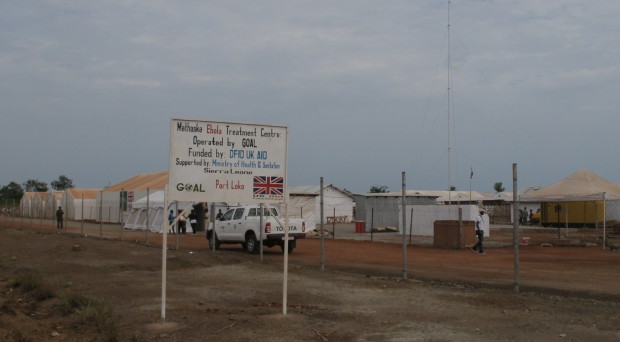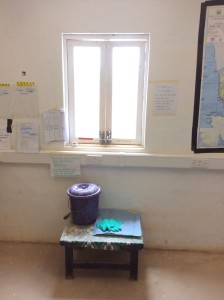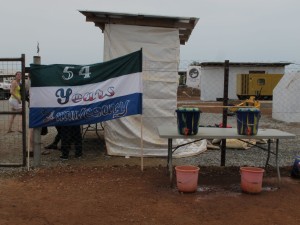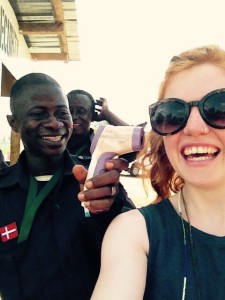
I recently returned from a five-week deployment to Port Loko, Sierra Leone, where I was working as a diagnostic laboratory staff member in an Ebola treatment centre (ETC). When I was offered deployment in April, several friends commented ‘Isn’t Ebola over now? I’ve not heard anything on the news for a while…’ Although the situation is vastly better than it was six months or a year ago, Ebola lingers on in Guinea and parts of Sierra Leone (with a recent re-emergence in Liberia), and the threat of fresh outbreaks remains very real*.
The laboratory was a small concrete building within the ETC complex. Unlike most areas of the ETC it was air conditioned in order to maintain laboratory equipment and reagents; however, despite this, temperatures in the lab were often over 30oC. We screened for Ebola viral RNA using polymerase chain reaction, in addition to malaria diagnosis and providing some basic haematology and biochemistry services. Malaria was an important differential diagnosis which we screened for by a rapid diagnostic test (RDT). The blood samples obtained (by venipuncture) would not have been appropriate for microscopy thick or thin film analysis. Treatment for malaria was available at the ETC and therefore a malaria diagnosis, whilst serious, could be something of a relief. The massive strain Ebola has placed on the health system in Sierra Leone has had a knock-on impact on the treatment and control of other diseases, including malaria. In this way, it is thought that the Ebola epidemic has caused many additional deaths in the affected countries.
Community samples were passed through windows into the lab from land adjacent to the ETC, while our own ETC samples were received through another window directly from the red zone, from suspect or positive patients. The treatment centre itself was a large complex of tents, built last November in a relatively remote location away from the town of Port Loko. The first time I saw it I started to fully understand the scale of what had happened, and the response that had been and was still necessary to bring the situation under control.
 Prior to any handling, specimens were immersed in 5000 ppm bleach at sample reception. Bleach became part of our lives: most equipment was bleached daily, specimens were decontaminated with bleach, 5000 ppm bleach came out of the taps – until they had to disconnect as the pipes were in danger of degradation, then it was fetching buckets of bleach. I was initially worried that I wouldn’t acclimatise to the heat and the bleach vapour, but with the work to focus on and the learning curve being steep, we adapted quickly.
Prior to any handling, specimens were immersed in 5000 ppm bleach at sample reception. Bleach became part of our lives: most equipment was bleached daily, specimens were decontaminated with bleach, 5000 ppm bleach came out of the taps – until they had to disconnect as the pipes were in danger of degradation, then it was fetching buckets of bleach. I was initially worried that I wouldn’t acclimatise to the heat and the bleach vapour, but with the work to focus on and the learning curve being steep, we adapted quickly.
It took me approximately two hours to process a sample from reception to PCR, working quickly. How we divided the workload varied according to how busy the shift was, but generally one person would take a sample (or a batch of samples, according to what had been received) through from reception to PCR. During my time in the lab the majority of our samples were swabs from dead persons – currently all deaths in Sierra Leone are being tested for Ebola. Sanctions are placed on the burial until a negative result is received; therefore giving prompt results was paramount and our response times were closely monitored. Live patients were tested from whole blood samples, with all new patients simultaneously being tested for malaria.
The lab staff were a mix of both biomedical and research scientists, and of all career stages. This worked well, with different skill sets complimenting each other. Some had particularly strong molecular experience, and this helped us when we had problems with the RNA extraction reagents or deciphering problems with the internal controls (maintenance of reagents in those conditions wasn’t easy). Those with more clinical or diagnostic experience were particularly strong at other times: for example, I struggled with the significance of a result during my first week, and leaned heavily upon the experience and support of the biomedical staff.
We lived near the ETC and were transported there and back by minibus every day. We worked shifts, with the lab being open from 6am until 10pm daily. I very quickly settled into a routine of simply being aware of what shifts I was working over the upcoming days: very little else mattered. We were catered and cared for well and so didn’t have to think about food, or laundry, or any of the ‘normal’ everyday things. In working and living as part of a small team we got to know each other very well and very quickly, forming such close friendships that it was difficult for everyone going their separate ways at the end of deployment. It was quite familial, and we relied on each other for support: although we dealt with fewer samples than previous teams, and fewer positives, the nature of the work could be difficult at times.

Since my return many people have asked ‘How was it?’ – Which I struggle to answer. Maybe I can offer more insight by describing some of my best, and hardest, moments. Some parts were predictably difficult, or we had been forewarned: reading the clinical details that accompanied the samples and particularly the death swabs. During my team’s deployment we saw how one positive sample resulted in another outbreak, and unavoidably tracked its progress through the samples that we received. However for me, leaving was the hardest part: l felt a lack of fulfilment, partly because in the context of an outbreak there’s still work to be done. But there were many really great moments as well. We were in Sierra Leone on Independence Day and there were celebrations inside the ETC, with dancers, drummers and magicians performing for the staff. We were welcomed by the locals and frequently thanked for leaving our own jobs and lives temporarily to come and help. On my last shift I felt experienced enough to comfortably and safely process a child’s blood sample that had massively leaked in transit, and found it both malaria and Ebola negative.

So, how was it? It was intense, rewarding, hard work, tiring, and an emotional rollercoaster. As a researcher already working in tropical infectious disease the experience reaffirmed to me both my career choice and my inclination for working overseas. I am extremely glad I was able to go. And given the continued need for laboratory workers in both Sierra Leone and Guinea, and if personal and professional circumstances allowed, I would definitely re-deploy.
* For weekly, country-by-country situation reports see: https://apps.who.int/ebola/ebola-situation-reports.

Comments